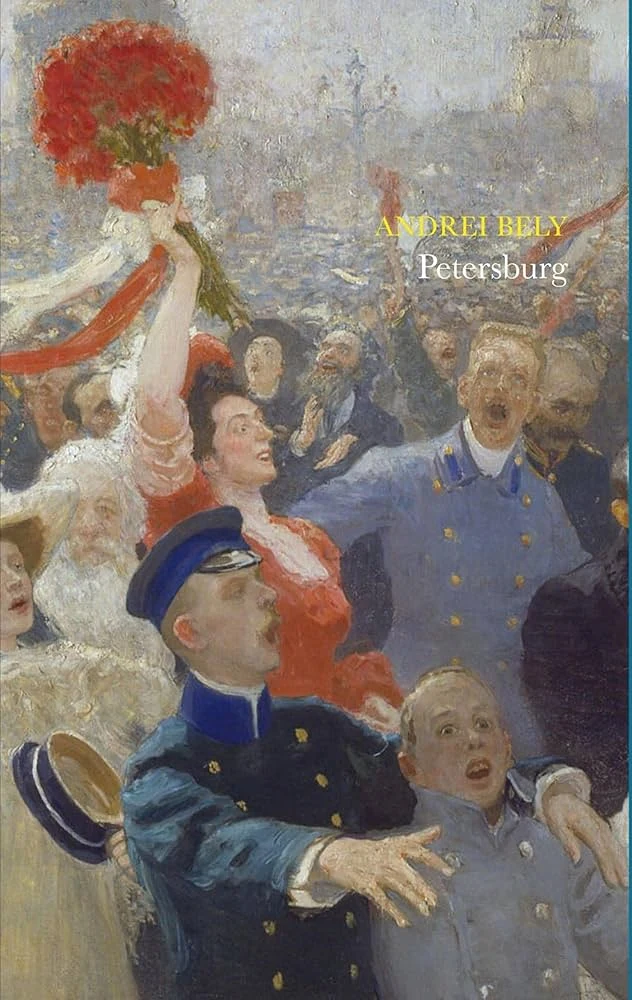!bookworms to discuss the first chapter of Andrei Bely's "Petersburg".
An neurodivergent old tsarist statesman (and a cuck) has a difficult relationship with his incel son but takes too long to realize his son's commie friends might be into something. Vivid descriptions of what St Petersburg looked like during the 1905 Revolution.
Next week discussion to cover chapter 2.






 aweonao
aweonao





Jump in the discussion.
No email address required.
I've read thru the chapter and I'm being brought into it slowly. Joyce did something similar in Dubliners and Ulyssess by having the City of Dublin itself become a character in the story through the descriptions and imagery used in relation to our characters POV.
Nikolai is introduced as a as so the City if Petersburg reflects and amplifies that angst and anxiety. Petersburg is dank, dark, convoluted and looming in the liminal space of Nikolai's perception of himself and his interfacing with the world around him.
as so the City if Petersburg reflects and amplifies that angst and anxiety. Petersburg is dank, dark, convoluted and looming in the liminal space of Nikolai's perception of himself and his interfacing with the world around him.
Apollon is a also
also 
!bookworms
Jump in the discussion.
No email address required.
Apollon is paranoid and the Raznochintsy don't seem to be very bright.
Parallels have been drawn between this book and Ulysses, no wonder Vladimir Nabokov liked it so much.
Jump in the discussion.
No email address required.
Apollon noting that his image has been plastered on "yid magazines " of blood red colour was pretty funny tho
" of blood red colour was pretty funny tho 


Jump in the discussion.
No email address required.
More options
Context
More options
Context
More options
Context
So, ok I didn't fully read through the first chapter yet, but even up to here, i feel like a brainlet . The book feels incredibly hard to read. The narrative constantly meanders into talking about strange histories, it's veiled in weird metaphors, and the narrator is just strange. The tram line for example. It's just confusing.
. The book feels incredibly hard to read. The narrative constantly meanders into talking about strange histories, it's veiled in weird metaphors, and the narrator is just strange. The tram line for example. It's just confusing.
Otherwise I'm liking the setting so far. I've always been fascinated by Russian history even though I've always felt I'm way too ignorant about it compared to a lot of the histories of western nations. The interesting thing about Russia is that they were always a bit behind the west in a lot of things and their culture - at least the part that faced outwards - reflects that. When Europe was already at the peak of the bourgeois revolutions, when the Springtime of nations created the largest Revolutionary wave in Europe, as romantic nationalism inspired people to demand freedom and liberty, the Russians were still considering whether or not to abolish serfdom. The Revolution of 1905 was the Russian version of the Springtime of Nations - only about 50 years too late.
The Russian aristocracy also always wanted to emulate the west, only for the west to treat them like half-orientals. For example, the book talks about the "lines" that were supposed to be the canals and those canals were mean to imitate the western cities of Amsterdam or Venice, but in typical Russian fashion that didn't really work out in the marshy swamps of Petrograd.
Jump in the discussion.
No email address required.
It's definitely a hard book, I'm reading the McDuff translation from Penguin editions which has these footnotes for references, it seems like the original Russian text used a lot of wordplay. The narrator is written like someone with a shoddy memory (he cites the tram and then corrects himself as there was no tram in 1905 yet), but he follows the POV characters, I thought that was sort of humorous.
Events like the Decembrist uprising and the Springtime of nations made Tsar Nicholas I disdainful of western ideologies and even technology (hence the reason of Russia's late industrialization). Then the following rules and their cabinets after Alexander II became fond of "modernization", or catching up with Western Europe in technological and economic terms without giving an inch to political reformers and dissidents.
Jump in the discussion.
No email address required.
Expounding on this: when Alexander II passed major liberal reforms, political violence skyrocketed and the tsar got a bomb thrown at his feet and got horrifically mangled and died after hours of agony -- hours of agony that were personally witnessed by the next (and final) two tsars, who both concluded that liberal reforms would destroy Russia
Jump in the discussion.
No email address required.
More options
Context
More options
Context
you're fricking bananas if you think I'm reading all that, take my downmarsey and shut up idiot
Jump in the discussion.
No email address required.
More options
Context
More options
Context
Death to vatziggers.....oh wait sorry wrong thread
Jump in the discussion.
No email address required.
More options
Context
The repeating words and phrases very nearly filtered me. I hope it reads more poetic in the original Russian. Unless it's purposefully annoying to make us think Apollon is an r-slur, but even if that's the case I didn't like it.
Jump in the discussion.
No email address required.
More options
Context
The only thing Petersburg deserves:
Jump in the discussion.
No email address required.
More options
Context
Jump in the discussion.
No email address required.
More options
Context